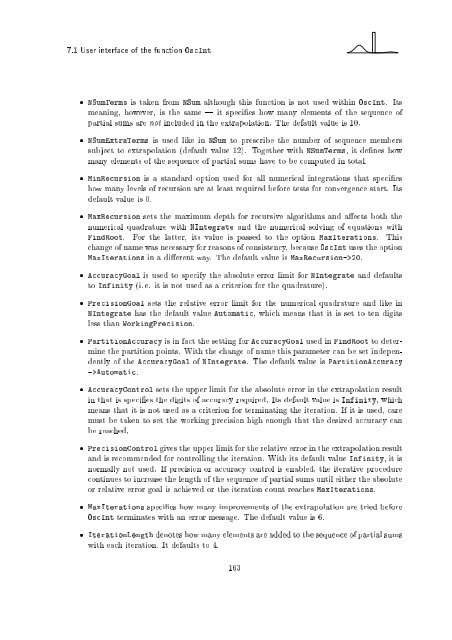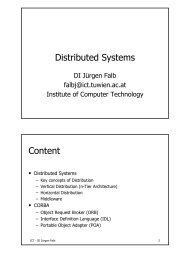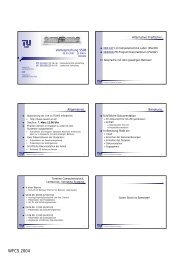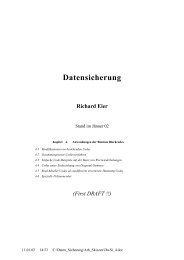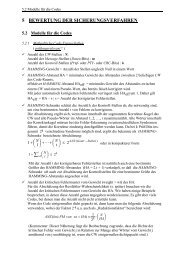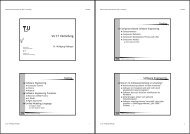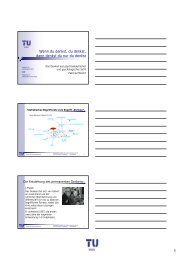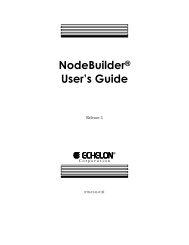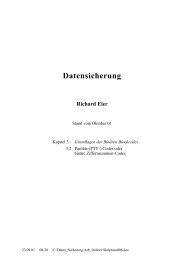Wave Propagation in Linear Media | re-examined
Wave Propagation in Linear Media | re-examined
Wave Propagation in Linear Media | re-examined
Create successful ePaper yourself
Turn your PDF publications into a flip-book with our unique Google optimized e-Paper software.
7.1 User <strong>in</strong>terface of the function OscInt<br />
NSumTerms is taken from NSum although this function is not used with<strong>in</strong> OscInt. Its<br />
mean<strong>in</strong>g, however, is the same | it speci es how many elements of the sequence of<br />
partial sums a<strong>re</strong> not <strong>in</strong>cluded <strong>in</strong> the extrapolation. The default value is 10.<br />
NSumExtraTerms is used like <strong>in</strong> NSum to p<strong>re</strong>scribe the number of sequence members<br />
subject to extrapolation (default value 12). Together with NSumTerms, it de nes how<br />
many elements of the sequence of partial sums have to be computed <strong>in</strong> total.<br />
M<strong>in</strong>Recursion is a standard option used for all numerical <strong>in</strong>tegrations that speci es<br />
how many levels of <strong>re</strong>cursion a<strong>re</strong> at least <strong>re</strong>qui<strong>re</strong>d befo<strong>re</strong> tests for convergence start. Its<br />
default value is 0.<br />
MaxRecursion sets the maximum depth for <strong>re</strong>cursive algorithms and a ects both the<br />
numerical quadratu<strong>re</strong> with NIntegrate and the numerical solv<strong>in</strong>g of equations with<br />
F<strong>in</strong>dRoot. For the latter, its value is passed to the option MaxIterations. This<br />
change of name was necessary for <strong>re</strong>asons of consistency, because OscInt uses the option<br />
MaxIterations <strong>in</strong> a di e<strong>re</strong>nt way. The default value is MaxRecursion->20.<br />
AccuracyGoal is used to specify the absolute error limit for NIntegrate and defaults<br />
to Inf<strong>in</strong>ity (i. e. it is not used as a criterion for the quadratu<strong>re</strong>).<br />
P<strong>re</strong>cisionGoal sets the <strong>re</strong>lative error limit for the numerical quadratu<strong>re</strong> and like <strong>in</strong><br />
NIntegrate has the default value Automatic, which means that it is set to ten digits<br />
less than Work<strong>in</strong>gP<strong>re</strong>cision.<br />
PartitionAccuracy is <strong>in</strong> fact the sett<strong>in</strong>g for AccuracyGoal used <strong>in</strong> F<strong>in</strong>dRoot to determ<strong>in</strong>e<br />
the partition po<strong>in</strong>ts. With the change of name this parameter can be set <strong>in</strong>dependently<br />
of the AccuracyGoal of NIntegrate. The default value is PartitionAccuracy<br />
->Automatic.<br />
AccuracyControl sets the upper limit for the absolute error <strong>in</strong> the extrapolation <strong>re</strong>sult<br />
<strong>in</strong> that is speci es the digits of accuracy <strong>re</strong>qui<strong>re</strong>d. Its default value is Inf<strong>in</strong>ity, which<br />
means that it is not used as a criterion for term<strong>in</strong>at<strong>in</strong>g the iteration. If it is used, ca<strong>re</strong><br />
must be taken to set the work<strong>in</strong>g p<strong>re</strong>cision high enough that the desi<strong>re</strong>d accuracy can<br />
be <strong>re</strong>ached.<br />
P<strong>re</strong>cisionControl gives the upper limit for the <strong>re</strong>lative error <strong>in</strong> the extrapolation <strong>re</strong>sult<br />
and is <strong>re</strong>commended for controll<strong>in</strong>g the iteration. With its default value Inf<strong>in</strong>ity, itis<br />
normally not used. If p<strong>re</strong>cision or accuracy control is enabled, the iterative procedu<strong>re</strong><br />
cont<strong>in</strong>ues to <strong>in</strong>c<strong>re</strong>ase the length of the sequence of partial sums until either the absolute<br />
or <strong>re</strong>lative error goal is achieved or the iteration count <strong>re</strong>aches MaxIterations.<br />
MaxIterations speci es how many improvements of the extrapolation a<strong>re</strong> tried befo<strong>re</strong><br />
OscInt term<strong>in</strong>ates with an error message. The default value is 6.<br />
IterationLength denotes how many elements a<strong>re</strong> added to the sequence of partial sums<br />
with each iteration. It defaults to 4.<br />
163


